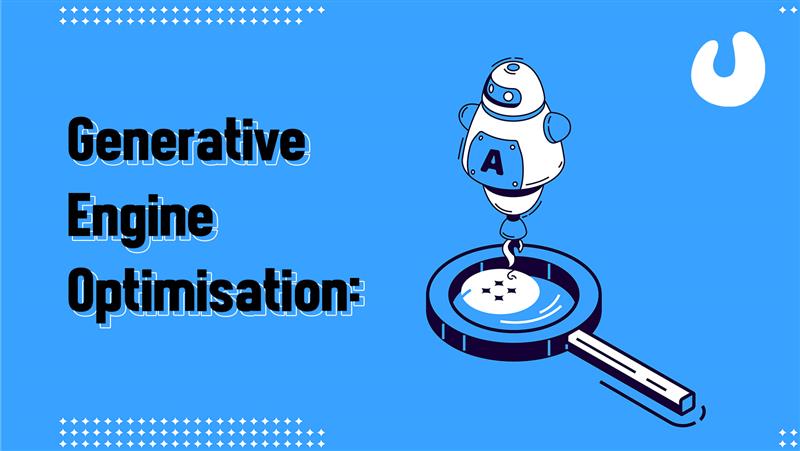

Something big is changing in how people search for information online.
Traditional search engines like Google still matter. But now, millions of users are asking ChatGPT, Google Gemini, and Claude for answers instead. These AI tools don’t just show links. They create complete answers on the spot.
This shift is creating a new challenge for businesses. How do you make sure AI tools mention your brand when people ask questions?
The answer is Generative Engine Optimisation. In this guide, you’ll learn what GEO Service really means, how it differs from regular SEO, and why your business needs it right now. We’ll also look at how companies offering SEO services in India and agencies worldwide are adapting to this change.
Let’s start with the basics.
Generative Engine Optimisation is the practice of making your content visible to AI-powered answer engines.
Think about how you use ChatGPT or Gemini. You ask a question. The AI reads millions of sources instantly. Then it creates a custom answer just for you. But here’s the key point: the AI only mentions sources it finds trustworthy and clear.
GEO focuses on becoming that trusted source. It’s about structuring your content so generative engine AI can understand it, trust it, and cite it. This is very different from traditional SEO, which focuses on ranking high in search results.
What is generative SEO really about? It’s about being the answer, not just linking to the answer.
Traditional search shows ten blue links. You click one and read. AI search reads everything first, then tells you what matters. According to recent data, over 40% of young users now prefer AI tools over Google for research questions. This number keeps growing every month.
Here’s a real example. Search Google for “best project management software.” You’ll see ads, then articles, then comparison sites. Now ask ChatGPT the same question. It gives you a direct comparison with specific recommendations. The sources it mentions? Those are the companies winning at GEO.
The difference matters because user behaviour is changing fast. When an AI recommends your product or service, that carries weight. When it doesn’t mention you at all, you’re invisible to a growing segment of searchers.
Generative SEO doesn’t replace traditional SEO. It builds on top of it.
Both approaches need quality content. Both need authority and trust. Both benefit from properly structured data. A good SEO Marketing Agency understands this overlap and uses it.
But the differences matter too. Traditional SEO chases rankings. You want position #1 for your target keywords. Generative SEO chases citations. You want AI engines to mention your brand when answering related questions.
Traditional SEO loves keyword density. Generative SEO loves clear, complete answers. Traditional SEO optimises for algorithms. Generative SEO optimises for comprehension.
The goal has changed. It used to be “rank #1 on Google.” Now it’s “become the source AI engines cite.” This shift changes how you write content, structure information, and build authority.
Smart businesses run both strategies together. Your traditional SEO brings traffic from Google. Your GEO strategy makes sure AI tools recommend you. A professional GEO Service understands how to balance both approaches.
Are the companies winning right now? They started early. They built content that works for both humans searching Google and AI engines scanning for answers. This dual approach costs more upfront but pays off as AI search grows.
Professional GEO Service providers focus on making your content AI-readable.
This starts with content optimisation. Your articles need a clear structure. Your information needs context. Your facts need sources. AI engines prefer content that answers questions completely in one place. They also look for author credentials and consistent information across multiple sources.
Entity-based structuring matters too. This means clearly defining who you are, what you do, and how you relate to your industry. When AI engines scan your content, they build a map of concepts. Proper structuring helps them place you correctly in that map.
Authority building extends beyond your website. You need mentions on other trusted sites. You need consistent information across directories. You need thought leadership content that other sites reference. Geotechnical services handle this technical foundation while keeping everything connected.
Technical infrastructure plays a bigger role than most businesses realise. Schema markup tells AI engines exactly what your content means. Semantic SEO connects your topics to related concepts. API readiness ensures AI tools can access your data efficiently.
Many companies offering SEO services in India are now adding these GEO components to their packages. They understand that technical excellence matters more as AI search grows.
An experienced SEO Marketing Agency bridges the gap between old and new. They maintain your Google rankings while building your AI visibility. They track both traditional metrics and AI citations. They adjust strategy based on how different engines respond to your content.
The technical side includes structured data implementation, knowledge graph optimisation, and cross-platform consistency. It’s not simple work. It requires constant monitoring and adjustment. But it’s becoming essential for digital visibility.
Competitive markets move fast. This is especially true in places like Dubai and India.
The best digital marketing agency in Dubai already integrates GEO into client strategies. Dubai’s market is highly competitive and tech-forward. Businesses there know that early adoption creates an advantage. When your competitors aren’t mentioned by AI engines but you are, you win customers.
Similarly, SEO services in India are rapidly evolving. India’s digital market is massive and growing. Companies there understand that AI search adoption happens faster with younger, tech-savvy populations. Agencies in Mumbai, Bangalore, and Delhi are training teams on GEO techniques right now.
First-mover advantage is real. When you start optimising for AI engines today, you build authority before your competitors do. AI engines learn which sources to trust over time. Being mentioned early and often builds that trust faster.
The ROI comparison shows clear benefits. Traditional SEO still works, but it’s getting more expensive. Competition for top rankings is fierce. GEO offers a new channel with less competition right now. Smart businesses invest in both.
Consider this: a small software company might spend months fighting for page one on Google. But with a good GEO strategy, they can get cited by ChatGPT within weeks. The exposure reaches different users, but it’s just as valuable.
Markets that adopt AI tools faster see bigger GEO benefits sooner. Professional services, software, healthcare, and finance are leading sectors. Any business that sells based on expertise should prioritise GEO now.
Getting started with Generative Engine Optimisation doesn’t require a complete overhaul. You can begin with smart, focused changes to your existing strategy.
Start with your best content and optimise it for AI comprehension first. Then expand to other pages. Track how AI engines reference your brand and adjust based on what works. Here are the key areas to focus on:
The key is consistency. AI engines trust sources that provide reliable, accurate information across many touchpoints. Work with a qualified GEO Service provider if you need help implementing these strategies at scale.
Generative Engine Optimisation isn’t replacing traditional SEO. It’s the next step in making your business visible online.
The shift is happening now. Every month, more people use AI tools to find information, make decisions, and discover brands. Businesses that optimise for these engines today will own the citations tomorrow.
Start by checking your current content. Ask yourself: Would an AI engine cite this? Is it clear, complete, and authoritative?
The future of digital marketing includes generative engine AI at its core. Smart companies are already adapting. They’re working with experienced agencies that understand both traditional and AI-powered search.
Don’t wait until your competitors dominate AI search results. Start your GEO strategy now. Partner with experts who can handle both your SEO and your AI visibility. The early advantage is still available, but it won’t last forever.
Most businesses see initial AI citations within 2-3 months of implementing GEO strategies. Full results typically take 6-9 months, similar to traditional SEO but sometimes faster. Speed depends on your content quality, domain authority, and market competition. Technical optimisations show results faster than authority building.
Yes, small businesses often have advantages in GEO. AI engines value expertise over size. Niche authority matters more than broad presence. Local businesses can dominate location-based queries. Clear, focused content from specialists often gets cited over generic corporate content. Small businesses can move faster and build trust in specific areas.
No, keep your traditional SEO running. GEO works alongside it, not instead of it. Many optimisation techniques overlap between the two. The same quality content that ranks on Google can get cited by AI engines. Think of GEO as adding a new channel, not replacing an old one. Integrated strategies work best.
Information-rich industries see the biggest benefits. This includes software, professional services, healthcare, finance, and education. B2B companies that sell expertise benefit greatly. Local service businesses also gain from location-based AI searches. Any industry where people research before buying should prioritise GEO now.
How Do I Measure the Success of My GEO Efforts?
Track brand mentions in AI engine responses. Monitor how often AI tools cite your content. Check which pages get referenced most. Use tools that track AI visibility alongside traditional rankings. Measure increases in direct traffic from AI-aware users. Watch for growth in citations across multiple AI platforms.
